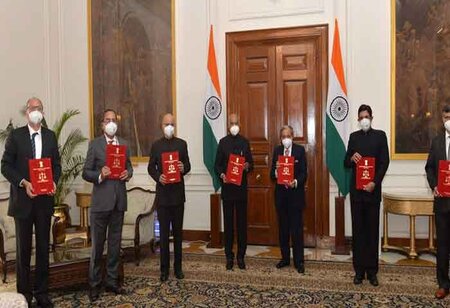15th Finance Commission report submitted today; read the key highlights here
 President Ram Nath Kovind will receive the final report today (November 9) from the NK Singh-headed 15th Finance Commission, the body which determines the shares of the Centre and States in all taxes and revenues of the country. The report is unlikely to be made public in the immediate future and will presumably be tabled by Finance Minister Nirmala Sitharaman in Parliament along with an action-taken report when she presents the Union budget next year on February 1. The 15th Finance Commission’s report is significant not only because the Union government’s relationship with states has frayed over payment of the Goods and Services Tax (GST) compensation cess, but also due to the enormous pressures on revenues due to the Covid-19 pandemic. Here are five things to watch out for:
President Ram Nath Kovind will receive the final report today (November 9) from the NK Singh-headed 15th Finance Commission, the body which determines the shares of the Centre and States in all taxes and revenues of the country. The report is unlikely to be made public in the immediate future and will presumably be tabled by Finance Minister Nirmala Sitharaman in Parliament along with an action-taken report when she presents the Union budget next year on February 1. The 15th Finance Commission’s report is significant not only because the Union government’s relationship with states has frayed over payment of the Goods and Services Tax (GST) compensation cess, but also due to the enormous pressures on revenues due to the Covid-19 pandemic. Here are five things to watch out for:
Smaller pie: At a time when the base of resources is shrinking due to the pandemic, which has raised government expenditure, while cutting revenues, all eyes are on how much share in taxes the 15th Finance Commission’s report would recommend for the states. All previous Finance Commissions have incrementally increased states’ share in the pool of taxes. The 14th Finance Commission had recommended a quantum leap, increasing states’ share by 10 percentage points to 42 percent. One of the mandates of the 15th Finance Commission is to review recommendations from the 14th Finance Commission. In the 2020-21 interim report, the share of states was reduced to 41 percent due to the formation of the new Jammu and Kashmir and Ladakh Union Territories. Any more reduction will spark opposition from states.
The 15th Finance Commission report may make historic recommendations in the area of public health care. For the first time, it will contain a chapter on public health care in the country, health infrastructure and spending. In an interview on July 8 to HT, 15th Finance Commission’s chairman NK Singh had suggested that the commission was working towards a financing model to raise federal public-health spending to about 2.1% of the country’s gross domestic product (GDP) over the next five years. The total expenditure on health by the Centre and states for 2019-20 was Rs 2.6 lakh crore, or just 1.29% of GDP, which is lower than most peer nations.
A main proposal from the Centre to the 15th Finance Commission for the fulfilment of long-term defence infrastructure spending is the development of a non-lapsable defence and internal security fund, either by the allocation of the divisible pool of funds shared by the Centre and States or through a cessation. If this is agreed, a permanent defence fund for the country will be established.
Strained finances: Given the ‘shrinking base’, what states would get in absolute terms will matter more than their percentage share. Also, since the pie is smaller, the grants component recommended by the 15th Finance Commission will become crucial for states. The approach on the grants component, which will be percentage amounts, will lend a “degree of sustainability, predictability and reduces volatility (in states’ finances),” an official told HT on November 7, requesting anonymity.
Equity and fairness: Before the 15th Finance Commission, the Covid-19 pandemic posed a specific challenge. Ultimately, its guidelines decide on the distribution of financial resources to states and the Centre, which have an impact on development expenditure, the major issues of life expectancy, health, livelihood, economic and security challenges. It must ensure that the income strains resulting from the pandemic are dealt with fairly.




